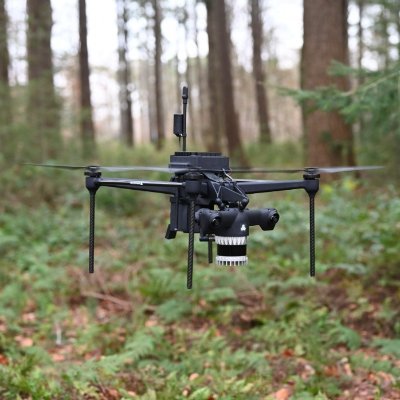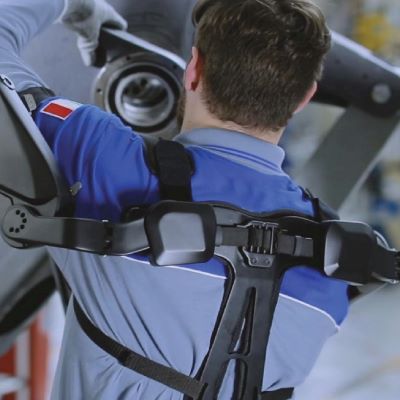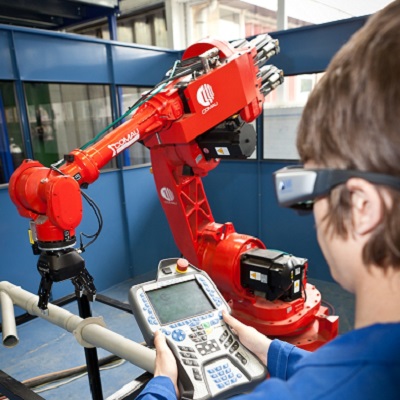Contact Dr Anne-Marie Oostveen
- Email: J.M.Oostveen@cranfield.ac.uk
- Twitter: @ArieOostveen
- ORCID
- Google Scholar
- ResearchGate
Areas of expertise
- Industrial Automation
- Industrial Ergonomics and Human Factors
Background
Anne-Marie holds a PhD in Social Informatics and an MA in Cultural Anthropology from the University of Amsterdam. Before joining the Industrial Psychology and Human Factors Group at Cranfield University in 2020, she held research positions at the University of Oxford, the Rathenau Institute, the Royal Netherlands Academy of Arts and Sciences, and the University of Amsterdam .
Her research explores the intersection of technology, society, and ethics, focusing on how emerging technologies impact people’s lives, work, and values. With a strong participatory approach, she’s worked on both the design and evaluation of technologies in areas ranging from public services to automation and AI.
Anne-Marie’s work has been funded by the European Commission, EPSRC, and other major institutions. She was awarded a Marie Curie Intra-European Fellowship to explore e-democracy and public trust and has published extensively across academic and public-facing platforms.
Research opportunities
Anne-Marie’s current work centres on the ethics of AI and robotics, with a particular focus on emerging fields such as drones, digital manufacturing, soft robotics, and nanobots. She explores how these technologies are developed, how they might be used responsibly, and how frameworks like the EU AI Act can help embed socio-ethical principles into research and design. Her aim is to ensure that innovation is not only technically advanced but also aligned with public values, trust, and societal needs.
This focus builds on a long-standing interest in the relationship between technology and society. Earlier in her career, Anne-Marie studied large and complex socio-technical systems, including e-voting, automated border control, and digital public service platforms. She examined how such systems are used and perceived, and how people’s values, attitudes, and behaviours shape their adoption. She has also investigated surveillance technologies such as biometrics and child-tracking systems, always with attention to the social trends and debates driving technological change.
Her approach is participatory and problem-oriented: she believes that technologies should not only be designed for people but also with them, by involving diverse stakeholders in the process.
Beyond her own research, Anne-Marie plays an active role in the broader robotics and AI ethics community. She serves on the Editorial Board of the Journal of Climbing and Walking Robots (JCWR), published by Bon View, where she contributes to shaping the direction of scholarship in the field. She is also Guest Editor of a Special Issue on “Enhancing Manufacturing through Human-Collaborative Robot Integration” for Applied Sciences. In addition, Anne-Marie serves as the General Chair for the ICRES 2026 and CLAWAR 2026 conferences. As an independent expert for the European Commission, she evaluates proposals, reviews projects, and supports the development of new programmes and policies.
Current activities
CURRENT CRANFIELD PROJECTS
- FEROX: Using AI, robotics, and data tools to support wild food harvesting in Nordic forests, FEROX aims to improve working conditions for seasonal berry pickers. Anne-Marie leads research on work practices, socio-ethical impacts, and user acceptance. [https://ferox.fbk.eu]
TEACHING
- MSc Applied Artificial Intelligence: Module leader and lecturer 'Ethical, Regulatory, and Social Aspects of AI' (ERS) compulsory module. [https://www.cranfield.ac.uk/courses/taught/applied-artificial-intelligence]
- MSc Connected and Autonomous Vehicles Engineering: Module leader and lecturer 'Ethics, Safety, and Regulation' (ESR).
- MSc Robotics: Lecturer 'Psychology, Ethics and Standards' (PES) compulsory module. [https://www.cranfield.ac.uk/courses/taught/robotics]
- Short Course: Module leader and lecturer on the 2-day intensive course 'Ethics of AI and Robotics', which equips professionals and academics with the tools and knowledge to address the societal, legal, and environmental implications of these transformative technologies. [https://www.cranfield.ac.uk/courses/short/aerospace/aero-ethics-of-ai-and-robotics]
PREVIOUS CRANFIELD PROJECTS
- Made Smarter Innovation – Smart Robotics: This UKRI-funded centre addresses the social acceptability of collaborative robots in manufacturing. Anne-Marie investigates how automation reshapes work, skills, and public perception—developing ethical frameworks and policy guidance.
- DigiTOP: Exploring how trust, ethics, and awareness influence the adoption of digital manufacturing technologies. Anne-Marie contributed to assessing individual and organisational readiness for tech integration on factory floors.
- RAS Human Factors (MOD/Dstl): Developed guidance on human-centred design and testing of robotic and autonomous systems (RAS) in defence, with a focus on usability, safety, and trust.
Publications
Articles In Journals
- Oostveen A-M, Eimontaite I & Fletcher S. (2025). Human factors in digital manufacturing technology adoption: a workforce perspective. The International Journal of Advanced Manufacturing Technology, ahead-of-print(11-12)
- Budimir S, Fontaine JRJ, Huijts NMA, Haans A, IJsselsteijn WA, .... (2024). We are not equipped to identify the first signs of cyber–physical attacks: emotional reactions to cybersecurity breaches on domestic internet of things devices. Applied Sciences, 14(24)
- Huijts NMA, Haans A, Budimir S, Fontaine JRJ, Loukas G, .... (2023). User experiences with simulated cyber‑physical attacks on smart home IoT. Personal and Ubiquitous Computing, 27(6)
- Leesakul N, Oostveen A-M, Eimontaite I, Wilson ML & Hyde R. (2022). Workplace 4.0: exploring the implications of technology adoption in digital manufacturing on a sustainable workforce. Sustainability, 14(6)
- Ariansyah D, Erkoyuncu JA, Eimontaite I, Johnson T, Oostveen A-M, .... (2021). A head mounted augmented reality design practice for maintenance assembly: toward meeting perceptual and cognitive needs of AR users. Applied Ergonomics, 98(January)
- Oostveen A-M & Lehtonen P. (2018). The requirement of accessibility: European automated border control systems for persons with disabilities. Technology in Society, 52
- Vasalou A, Oostveen A, Bowers C & Beale R. (2015). Understanding engagement with the privacy domain through design research. Journal of the Association for Information Science and Technology, 66(6)
- Oostveen A-M, Vasalou A, Van den Besselaar P & Brown I. (2014). Child Location Tracking in the US and the UK: Same Technology, Different Social Implications. Surveillance & Society, 12(4)
- Oostveen A-M. (2010). CITIZENS AND ACTIVISTS. Information, Communication & Society, 13(6)
- Oostveen A. (2010). Outsourcing Democracy: Losing Control of e‐Voting in the Netherlands. Policy & Internet, 2(4)
- Oostveen AM & Besselaar PVD. (2009). Users' experiences with e-voting: a comparative case study. International Journal of Electronic Governance, 2(4)
- Oostveen A-M. (2008). Gauld, R., & Goldfinch, S. (2006). Dangerous Enthusiasms: E-Government, Computer Failure and Information System Development. Dunedin, New Zealand: Otago University Press 160 pp. $39.95 (softbound). Social Science Computer Review, 26(2)
- Oostveen A-M & van den Besselaar P. (2005). Trust, Identity, and the Effects of Voting Technologies on Voting Behavior. Social Science Computer Review, 23(3)
- Oostveen A-M & Van Den Besselaar P. (2004). Internet Voting Technologies and Civic Participation: The Users’ Perspective. Javnost - The Public, 11(1)
- Oostveen AM & Van Den Besselaar P. (2001). Linking databases and linking cultures: The complexity of concepts in international E-governement. IFIP Advances in Information and Communication Technology, 74
- Braun S & Oostveen A-M. Encryption for the masses? An analysis of PGP key usage. Mediatization Studies, 2(0)
Conference Papers
- Oostveen AM, Kaufmann M, Krempel E & Grasemann G. (2014). Automated border control: A comparative usability study at two European airports
- Vasalou A, Oostveen A-M & Joinson AN. (2012). A case study of non-adoption
- Oostveen A-M. (2011). The Internet as an Empowering Technology for Stigmatized Groups: a Case Study of Weight Loss Bloggers
- Oostveen A-M & van den Besselaar P. (2004). From small scale to large scale user participation
- Oostveen AM & Van Den Besselaar P. (2004). From small scale to large scale user participation: A case study of participatory design in e-government systems
- Oostveen AM & van den Besselaar P. (2004). Security as belief User’s perceptions on the security of electronic voting systems
- Callari T, Oostveen A-M, Hubbard E-M, Fletcher S & Lohse N. Where are we at? A review of the advances in the ethical aspects of human-robot collaboration
Books
- Oostveen A-M, Meyer ET & Pickering B. (2013). User Involvement in Future Internet Projects In Lecture Notes in Computer Science (7858 LNCS). Springer Berlin Heidelberg.
- Oostveen A-M, Hjorth I, Pickering B, Boniface M, Meyer ET, .... (2012). Cross-Disciplinary Lessons for the Future Internet In Lecture Notes in Computer Science (7281 LNCS). Springer Berlin Heidelberg.
- Oostveen A & Besselaar PVD. (2007). Non-Technical Risks of Remote Electronic Voting In Encyclopedia of Digital Government (3). IGI Global.
- Oostveen A-M & Van den Besselaar P. (2002). Linking databases and linking cultures In IFIP International Federation for Information Processing (74). Springer US.



